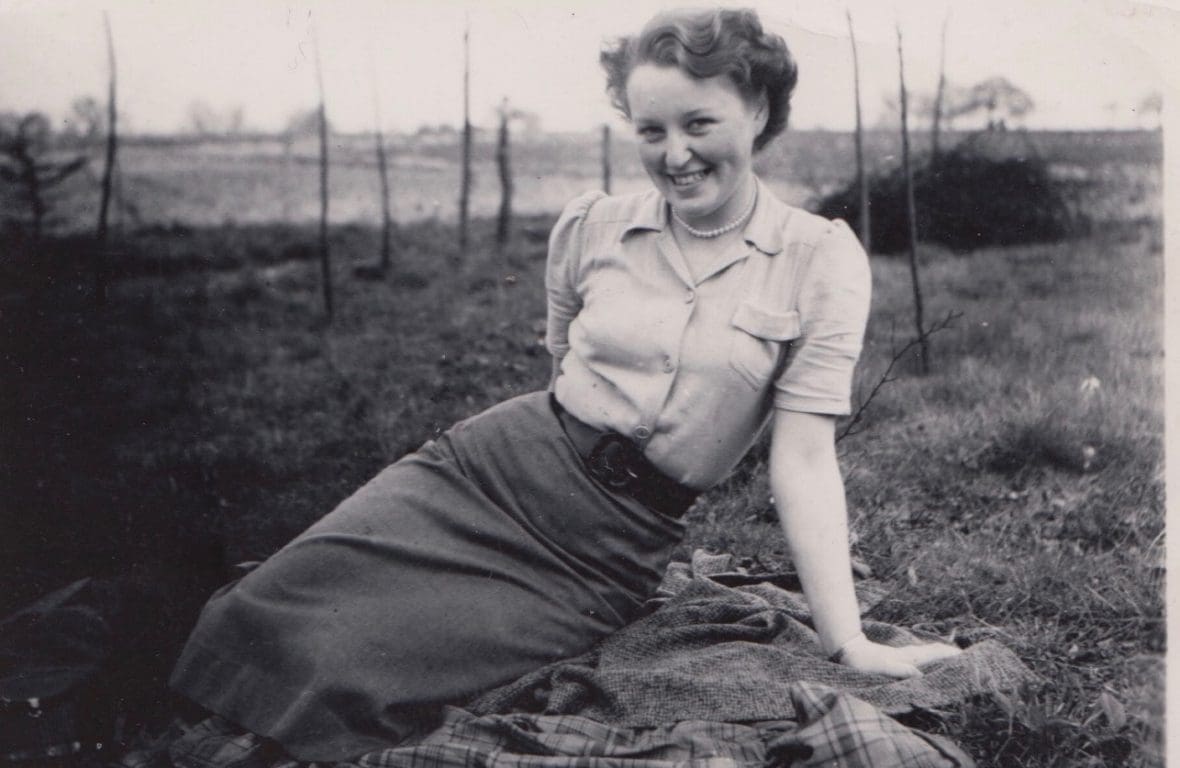“How Admiral Nurse Linda made a difference to my mum’s life”
Carer Emma Scattergood found the compassion of Admiral Nurse Linda was crucial in helping her and her family cope through the final years of her mother’s life.

Nancy on the day she moved to her new home – en route from Exeter to Christchurch
Mother’s Day can be a difficult time for families who have lost someone to dementia, who are struggling with the changes in personality it can bring, or who can’t be with their parents at the moment because of self-isolating.
Emma Scattergood, who cared for her vibrant mother, Nancy, for five years, and who is now facing her first Mother’s Day without her, reflects on the slow shift in their relationship.
Emma remembers her mum fondly, reflecting on how she “thrived at social gatherings and would out-dance the younger people there.” She was also bright and ambitious and worked her way up the career ladder as a department secretary at Exeter University.
However things soon began to change around the time of Nancy’s 80th birthday. Emma noticed that her mum would have difficulties with things which used to be second nature to her, like remembering her PIN number or the route around the once familiar streets of Exeter. When Emma came down for a party, she found reminder notes scattered over the surfaces of Nancy’s immaculate home and a fridge full of food past its use-by-date.
Emma recounts: “On the outside, my mum looked far, far younger than she was, and was fit and active, so I don’t think many people would have believed that she had dementia.” As a result, it was harder to get the support that could have helped them through this time.
Emma felt that her initial concerns were not taken as seriously by GPs as they could have been; there was no definitive answer as to what was going on with Emma’s mum. Did she have Mild Cognitive Impairment? Vascular dementia? It wasn’t until months later, after some pushing, that Nancy was diagnosed with mixed dementia.

Nancy when she was young
Closer to Home
As it was clear that her mum needed extra support, Emma suggested that Nancy move closer to Dorset to be closer to her. Her mum agreed, but then would forget and be resistant to the idea, which was upsetting for both of them. Emma called the Admiral Nurse Dementia Helpline, to ask their advice on whether she was doing the right thing.
“I spoke to the Admiral Nurses about how honest I should be in talking to her about the diagnosis, and they suggested that it might be better to avoid mentioning the word dementia in our conversations, as that only scared her afresh each time. Instead I focussed on the benefits of her living closer to me.”
By a stroke of luck, the house next door to Emma became available which was a huge relief to her. Nancy was able to move in soon after; but the confusion and forgetfulness Nancy experienced through being in a new, unfamiliar environment placed a huge strain on them both.
Emma contacted the Helpline again. “The Admiral Nurses wrote me a long, invaluable, email about my options in getting help from carers, and also organising respite care for my mum. There were links in the email to organisations that I wasn’t aware of. It went beyond anything I had found online myself, as it was so tailored to our personal situation. They even suggested that I could consider answering the phone to her a bit less, which made such a difference as I was struggling to care for her as well as my family.”
Reaching a crisis point
Emma arranged extra help in the form of companions for Nancy, which worked well until four years later when, as her memory became worse, Nancy became increasingly anxious and unhappy to be alone for any period of time.
The option of care homes was then mentioned by one of the companions. Emma knew that the dementia was progressing and would place even more strains on her than it had done previously, but it still felt like a big step.
She found what she felt was the best care home in the area, but unfortunately it became clear after six months or so that the staff at the home weren’t managing Nancy’s anxiety and short-term memory loss as well as Emma felt they should. She felt compelled to haveanother conversation with the Admiral Nurse Dementia Helpline.
“The Admiral Nurse on the Helpline really empathised and pointed me to research on how people with dementia need to be talked to and listened to, more than sedated through medication,” Emma reflects.
A move to a care home with an Admiral Nurse
Emma toured the county looking for a suitable homewith well-trained staff, a good layout for people with dementia and a calm environment. When she found a care home with an Admiral Nurse called Linda, 45 minutes away from her, everything finally fell into place.
From the first meeting with Linda, the nurse’s compassion and understanding shone through.
“If mum got distressed, Linda would know to take her off to a quiet corner to look at photographs to settle her; or she would move her away from the TV and towards the garden. She brought an extra level of care which I had not seen before.”
Just three weeks after moving in though, Nancy had a stroke, and lost mobility down one side. It became clear to Emma that her beloved mum was fading away– but Linda was there for her in these final hours.
“After mum had passed away at the care home, Linda joined me at mum’s bedside for some time. It was a reflection of just how much she meant to me and how supported I have felt by her.’
“Even though my mum is no longer with me, I am so grateful that she spent her last weeks in a place that really cared for her, and understood what she was going through.
“If anyone is struggling with dementia, please do seek help from the Admiral Nurses wherever possible, or ring up their Helpline – they were incredible in helping me support my mum and also in supporting me.”
